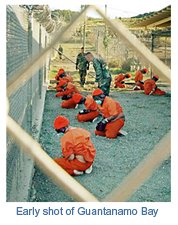
In June of this year the “Panel for the Reconstruction of the National Security Legal Foundation”, known informally as the Yanai Committee after the name of its chairman, filed its report with the government of Japan. The report called for a re-interpretation of Art. 9 of the Constitution so as to permit Japanese participation in collective self-defence and collective security operations. Both are currently understood to be prohibited by Art. 9.
Prime Minister Fukuda showed no interest in the report or the issues, and the report has received little public attention. With a new Prime Minister soon to be elected, and with emerging evidence that the Yanai Report is having more significant influence within the bureaucracy, it warrants more careful attention.
Over the next little while I will be posting entries here providing a detailed examination of the report. Since the report is not yet available in English (the original is available here), I will first provide an overview of the substance of those aspects of the report that I think are at least important for the analysis I wish to engage in. The substance should be reviewed in two posts, following which I will provide a segment with an analysis of the report – first criticizing its overall approach, and focusing on some of the interpretive errors that, in my view, the panel made; and then examining some of the limitations that it recommended be placed on the exercise of force, that may be useful for considerations of what a nuanced amendment might look like.
Background
Prime Minister Abe convened a “panel of experts” back in April 2007, to consider whether it was necessary to “revise the current interpretation of the Constitution”, in order to allow Japan to participate to a greater extent in international security activity. In particular, the panel was to consider four specific scenarios that highlighted the ramifications of the constitutional prohibition on collective self-defence and collective security operations.
The panel was comprised of thirteen people, mostly academics specializing in political science, foreign relations, and defence studies, and former government officals from the Ministry of Foreign Affairs and the Defence Agency. There was only one constitutional scholar among them, and only three legal specialists in total. The media was critical of the panel when it was announced for being a group with a public record of being hawkish on national security issues and of being critical of the constitutional constraints on Japan’s defence policy.
I wrote at the time (The Case Against “Revising Interpretations” of the Japanese Constitution ) that the exercise of using an extra-constitutional body to advance a “revision” of the interpretation of the Constitution, was illegitimate on a number of levels, the most important being that it was an end-run around the amendment provisions in the Constitution. The Report tends to confirm those concerns.


